Unit 8 Do you have a soccer ball? Section A Grammar Focus~3c 课件(共29张PPT)
文档属性
| 名称 | Unit 8 Do you have a soccer ball? Section A Grammar Focus~3c 课件(共29张PPT) |
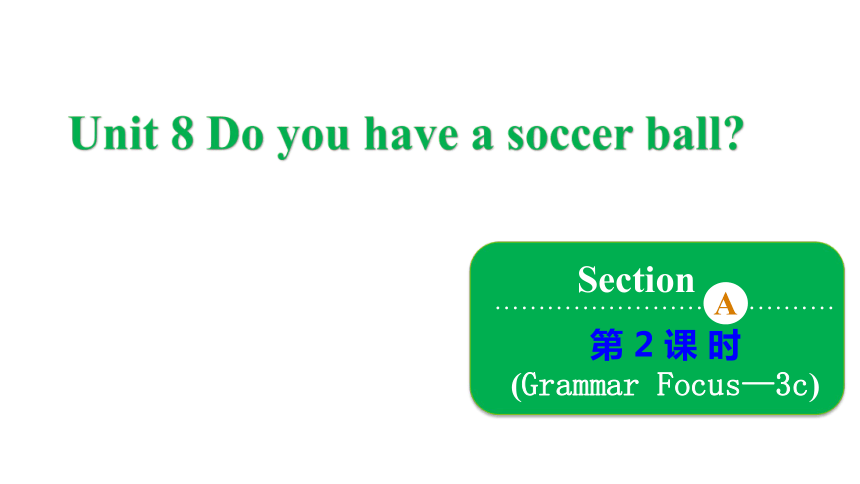
|
|
| 格式 | pptx | ||
| 文件大小 | 1.9MB | ||
| 资源类型 | 教案 | ||
| 版本资源 | 鲁教版 | ||
| 科目 | 英语 | ||
| 更新时间 | 2024-05-07 00:00:00 | ||
图片预览

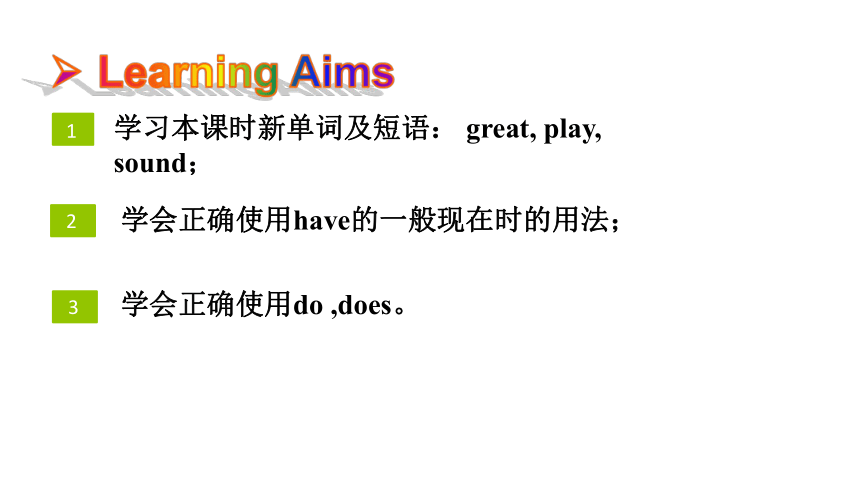
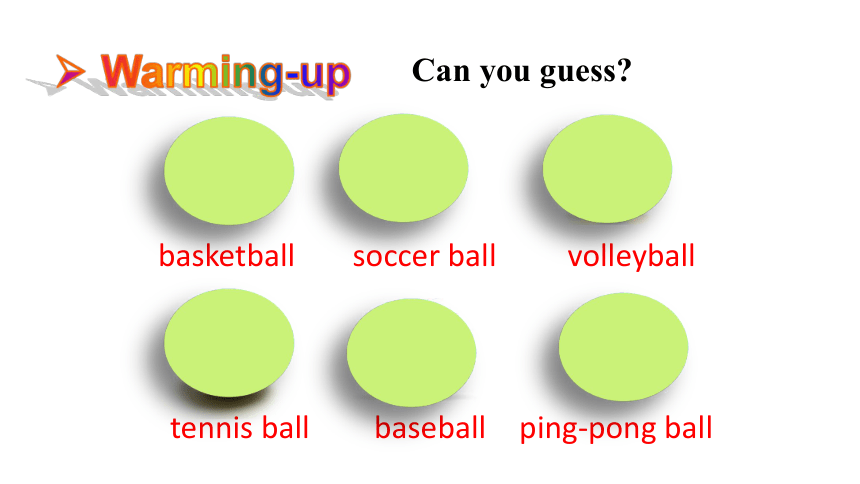
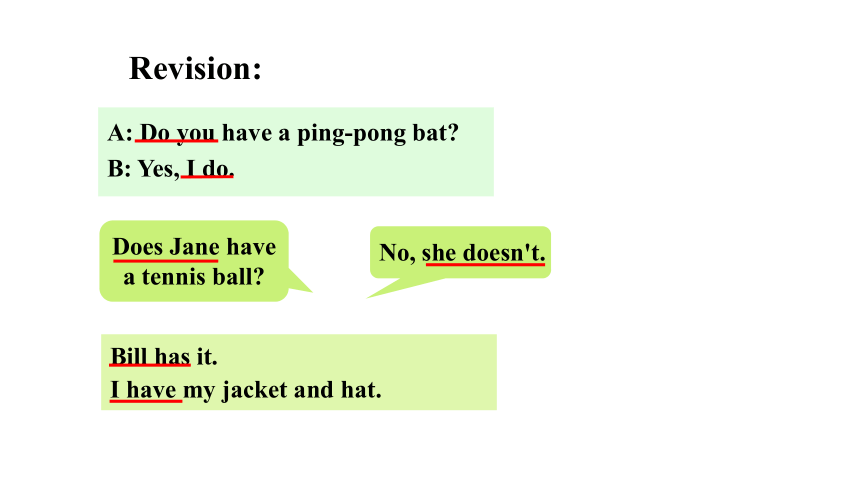
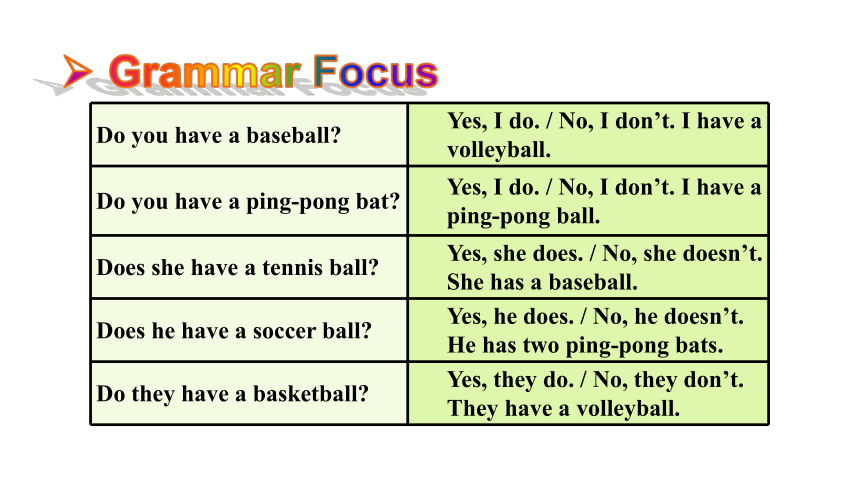
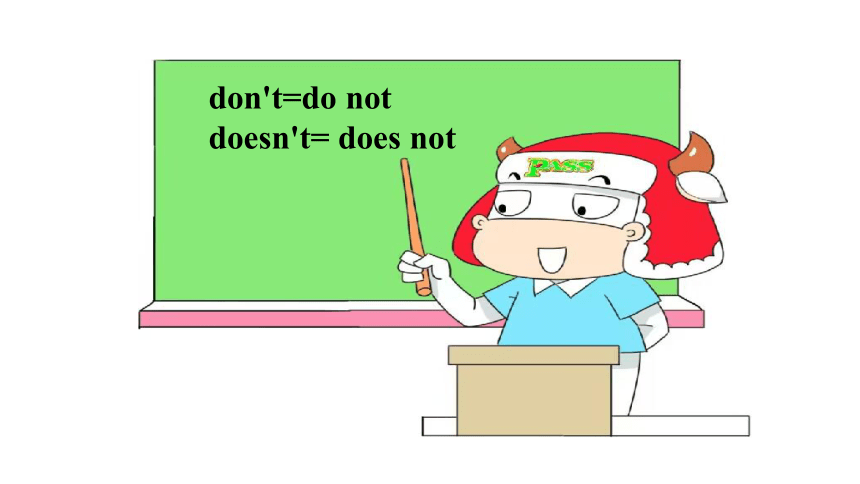
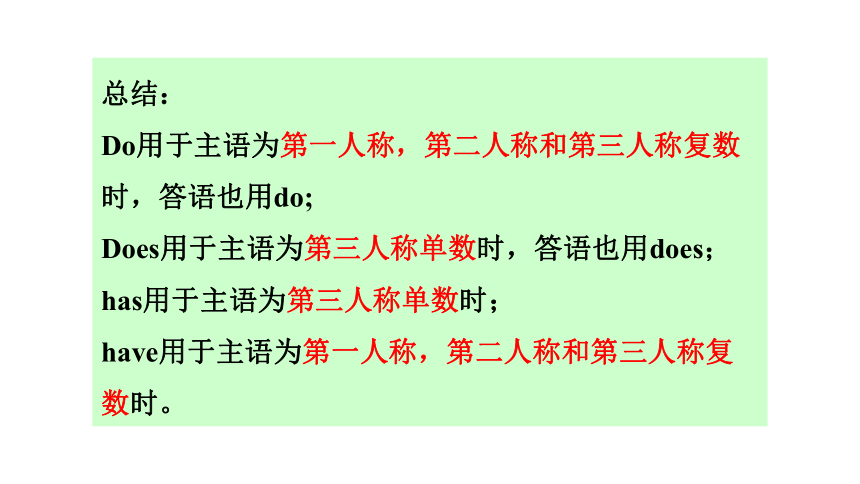
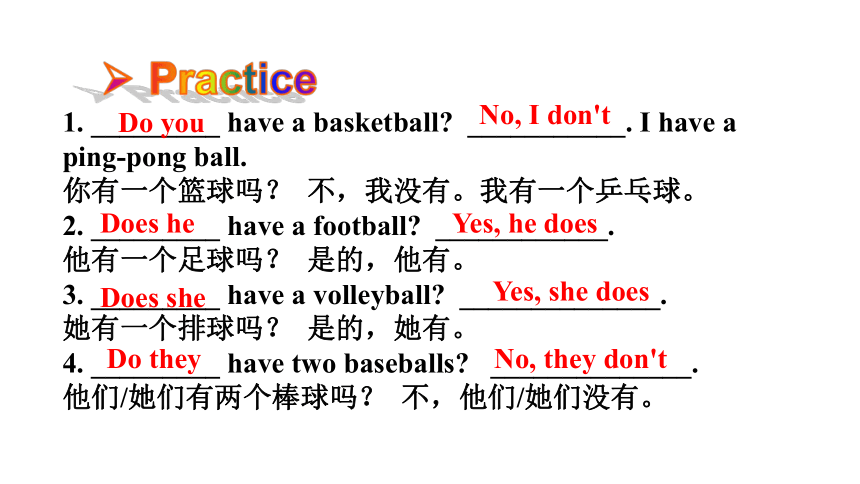
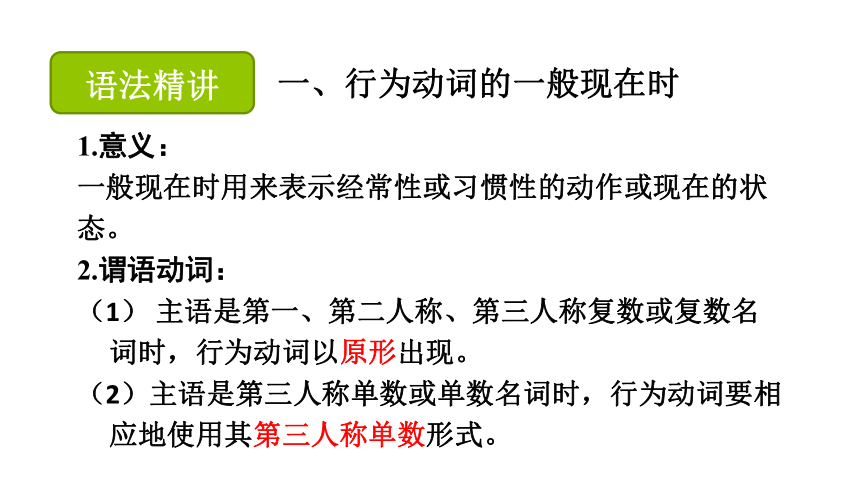
文档简介
(共29张PPT)
Unit 8 Do you have a soccer ball
Section
第 2 课 时
(Grammar Focus—3c)
…………………………………
A
1
2
Learning Aims
学习本课时新单词及短语: great, play, sound;
学会正确使用have的一般现在时的用法;
学会正确使用do ,does。
3
basketball
soccer ball
volleyball
tennis ball
ping-pong ball
baseball
Can you guess
Warming-up
Bill has it.
I have my jacket and hat.
Revision:
A: Do you have a ping-pong bat
B: Yes, I do.
Does Jane have a tennis ball
No, she doesn't.
Grammar Focus
Do you have a baseball Yes, I do. / No, I don’t. I have a volleyball.
Do you have a ping-pong bat Yes, I do. / No, I don’t. I have a ping-pong ball.
Does she have a tennis ball Yes, she does. / No, she doesn’t. She has a baseball.
Does he have a soccer ball Yes, he does. / No, he doesn’t. He has two ping-pong bats.
Do they have a basketball Yes, they do. / No, they don’t. They have a volleyball.
don't=do not
doesn't= does not
总结:
Do用于主语为第一人称,第二人称和第三人称复数
时,答语也用do;
Does用于主语为第三人称单数时,答语也用does;
has用于主语为第三人称单数时;
have用于主语为第一人称,第二人称和第三人称复
数时。
1. _________ have a basketball ___________. I have a
ping-pong ball.
你有一个篮球吗? 不,我没有。我有一个乒乓球。
2. _________ have a football ____________.
他有一个足球吗? 是的,他有。
3. _________ have a volleyball ______________.
她有一个排球吗? 是的,她有。
4. _________ have two baseballs ______________.
他们/她们有两个棒球吗? 不,他们/她们没有。
Do you
No, I don't
Yes, he does
Does he
Yes, she does
Does she
No, they don't
Do they
Practice
1.意义:
一般现在时用来表示经常性或习惯性的动作或现在的状态。
2.谓语动词:
(1) 主语是第一、第二人称、第三人称复数或复数名词时,行为动词以原形出现。
(2)主语是第三人称单数或单数名词时,行为动词要相应地使用其第三人称单数形式。
一、行为动词的一般现在时
语法精讲
3.句式:
(1) 变否定句时,当主语是第一、第二人称、第三人称复数或复数名词时,在行为动词前加don’t;当主语是第三人称单数或单数名词时,在行为动词前加doesn’t。
(2) 变一般疑问句时,当主语是第一、第二人称、第三人称复数或复数名词时,在句首加助动词do;当主语是第三人称单数或单数名词时,在句首加助动词does。 其肯定回答为“Yes, 主语+do/does.”,否定回答为“No, 主语+don’t/doesn’t.”
1.肯定句:
谓语动词have在句中有两种形式,即have和has。
have用于第一人称 (I, we), 第二人称 (you), 以及第三人称复数 (they)或其他复数名词等后;
has用于第三人称单数(he,she,it或单数名词)后。
二、have / has的用法
I have a volleyball. 我有一个排球。
He has some good friends.
他们有一些好朋友。
We have an American friend.
我们有一位美国朋友。
2.否定句:
变否定句时,需要借助助动词do或 does 的否定形式。
主语为非第三人称单数时, 句型为:
主语+don’t have...
I don’t have a baseball. 我没有棒球。
主语为第三人称单数时, 句型为:
主语+doesn’t have...
My sister doesn’t have a watch.
我的妹妹没有手表。
3.一般疑问句:
变一般疑问句时,也需要借助助动词do及其第三人称单数形式does。
主语为非第三人称单数时,句型为:Do+主语+have...
主语为第三人称单数时,句型为:Does+主语+have...
肯定回答: Yes, 主语+do / does.
否定回答: No, 主语+don’t / doesn’t.
—Do you have a basketball 你有篮球吗?
— Yes, I do. / No, I don’t.
是的,有。/ 不,没有。
— Does he have a tennis racket 他有一个网球拍吗?
— Yes, he does. / No, he doesn’t.
是的,他有。/ 不,他没有。
Write each word in the correct place in the chart.
I he they you
we she it Eric
do does
I
they
you
we
he
she
it
Eric
3a
Fill in the blanks with do or does. Then practice the conversations with your partner.
A: you have a baseball
B: Yes, I .
A: Great! I have a bat. Let’s play!
Do
do
1
3b
A: John have a soccer ball
B: No, he .
A: he have a ping-pong bat
B: Yes, he . I think he has a ping-pong
ball, too.
A: Hmm…let’s ask.
Does
doesn’t
does
Does
2
A: your friends have a basketball
B: Yes, they . They have two basketballs.
A: Well, let’s play basketball.
B: That sounds good.
Do
do
3
1. Let’s play basketball. 咱们打篮球吧。
play basketball意为“打篮球” 。play常与球类名词连用表示“踢球,打球”。此时,play与球类名词之间不加任何冠词。
Let’s play volleyball. 咱们打排球吧。
I can play soccer. 我会踢足球。
Language points
play也常与乐器类名词连用表示“弹奏某种乐器”。此时,play与乐器类名词之间要加定冠词the。
Let’s play the piano. 咱们弹钢琴吧。
I can play the guitar. 我会弹吉他。
He can play the violin. 他会拉小提琴。
拓展
2. That sounds good.那听起来不错。
That sounds good. 用于表示赞同对方所提的建议。类似的表达还有“That sounds like a good idea.”“That’s a good/great/nice idea.”“Sounds great/good.”等。
—Let’s play volleyball. 咱们打排球吧。
—That sounds good.那听起来不错。
注意:sound此处为连系动词,意为“听起来好像”,后面常跟形容词作表语。
Remember the things in Bob’s room. Close your
books. Then ask and answer questions with a
partner.
A: Does he have a soccer ball
B: Yes, he does.
A: Does he have a
ping-pong bat
B: No, he doesn’t.
3c
Make conversations with your partner. Talk about the pictures below.
A: Let’s play soccer.
B: I don’t have a soccer ball.
A: Well, let’s play volleyball.
B: That sounds good.
Pair work
I.写出下列动词的第三人称单数形式:have, do
II.按要求完成句子。
1.Does she have a volleyball (作否定回答)
2.I have a basketball.(把主语变成he)
3._______ play football. That _______ good.
4.Let ___ (I) help you. Thank you.
has
does
No, she doesn't.
He has a basketball.
Let's
sounds
me
Summary
Ⅰ.翻译句子。
Exercises
1. —— 你有网球吗?
——是的,我有。
2. —— 他有乒乓球拍吗?
——不,他没有。
—Do you have a tennis ball
—Yes, I do.
—Does he have a ping-pong bat
—No, he doesn’t.
1.I ________ a soccer ball, and she __________ a soccer ball, too.
A.have; have B.has; has C.have; has D.has; have
2.Let's ________ and help him.
A.go B.going C.to go D.Goes
3. —______ your son have a key
—No, he ________.
A. Do; don’t B. Does; doesn’t
C. Do; doesn’t D. Does; don’t
Ⅱ.单项选择。
C
A
B
Ⅲ.按要求完成下列各题。
1. I have two ping-pong bats. (改为一般疑问句)
____ ____ ____ two ping-pong bats
2. His brother has a soccer ball. (改为否定句)
His brother ________ ______ a soccer ball.
3. Do they like basketball (作否定回答)
_____, they ________.
4. I have a computer. (改为否定句)
I _____ ______ a computer.
Do you have
doesn’t have
No don’t
don’t have
Homework
1. Review the new words and expressions.
2. Look through Grammar Focus.
3. Practice the conversations.
Unit 8 Do you have a soccer ball
Section
第 2 课 时
(Grammar Focus—3c)
…………………………………
A
1
2
Learning Aims
学习本课时新单词及短语: great, play, sound;
学会正确使用have的一般现在时的用法;
学会正确使用do ,does。
3
basketball
soccer ball
volleyball
tennis ball
ping-pong ball
baseball
Can you guess
Warming-up
Bill has it.
I have my jacket and hat.
Revision:
A: Do you have a ping-pong bat
B: Yes, I do.
Does Jane have a tennis ball
No, she doesn't.
Grammar Focus
Do you have a baseball Yes, I do. / No, I don’t. I have a volleyball.
Do you have a ping-pong bat Yes, I do. / No, I don’t. I have a ping-pong ball.
Does she have a tennis ball Yes, she does. / No, she doesn’t. She has a baseball.
Does he have a soccer ball Yes, he does. / No, he doesn’t. He has two ping-pong bats.
Do they have a basketball Yes, they do. / No, they don’t. They have a volleyball.
don't=do not
doesn't= does not
总结:
Do用于主语为第一人称,第二人称和第三人称复数
时,答语也用do;
Does用于主语为第三人称单数时,答语也用does;
has用于主语为第三人称单数时;
have用于主语为第一人称,第二人称和第三人称复
数时。
1. _________ have a basketball ___________. I have a
ping-pong ball.
你有一个篮球吗? 不,我没有。我有一个乒乓球。
2. _________ have a football ____________.
他有一个足球吗? 是的,他有。
3. _________ have a volleyball ______________.
她有一个排球吗? 是的,她有。
4. _________ have two baseballs ______________.
他们/她们有两个棒球吗? 不,他们/她们没有。
Do you
No, I don't
Yes, he does
Does he
Yes, she does
Does she
No, they don't
Do they
Practice
1.意义:
一般现在时用来表示经常性或习惯性的动作或现在的状态。
2.谓语动词:
(1) 主语是第一、第二人称、第三人称复数或复数名词时,行为动词以原形出现。
(2)主语是第三人称单数或单数名词时,行为动词要相应地使用其第三人称单数形式。
一、行为动词的一般现在时
语法精讲
3.句式:
(1) 变否定句时,当主语是第一、第二人称、第三人称复数或复数名词时,在行为动词前加don’t;当主语是第三人称单数或单数名词时,在行为动词前加doesn’t。
(2) 变一般疑问句时,当主语是第一、第二人称、第三人称复数或复数名词时,在句首加助动词do;当主语是第三人称单数或单数名词时,在句首加助动词does。 其肯定回答为“Yes, 主语+do/does.”,否定回答为“No, 主语+don’t/doesn’t.”
1.肯定句:
谓语动词have在句中有两种形式,即have和has。
have用于第一人称 (I, we), 第二人称 (you), 以及第三人称复数 (they)或其他复数名词等后;
has用于第三人称单数(he,she,it或单数名词)后。
二、have / has的用法
I have a volleyball. 我有一个排球。
He has some good friends.
他们有一些好朋友。
We have an American friend.
我们有一位美国朋友。
2.否定句:
变否定句时,需要借助助动词do或 does 的否定形式。
主语为非第三人称单数时, 句型为:
主语+don’t have...
I don’t have a baseball. 我没有棒球。
主语为第三人称单数时, 句型为:
主语+doesn’t have...
My sister doesn’t have a watch.
我的妹妹没有手表。
3.一般疑问句:
变一般疑问句时,也需要借助助动词do及其第三人称单数形式does。
主语为非第三人称单数时,句型为:Do+主语+have...
主语为第三人称单数时,句型为:Does+主语+have...
肯定回答: Yes, 主语+do / does.
否定回答: No, 主语+don’t / doesn’t.
—Do you have a basketball 你有篮球吗?
— Yes, I do. / No, I don’t.
是的,有。/ 不,没有。
— Does he have a tennis racket 他有一个网球拍吗?
— Yes, he does. / No, he doesn’t.
是的,他有。/ 不,他没有。
Write each word in the correct place in the chart.
I he they you
we she it Eric
do does
I
they
you
we
he
she
it
Eric
3a
Fill in the blanks with do or does. Then practice the conversations with your partner.
A: you have a baseball
B: Yes, I .
A: Great! I have a bat. Let’s play!
Do
do
1
3b
A: John have a soccer ball
B: No, he .
A: he have a ping-pong bat
B: Yes, he . I think he has a ping-pong
ball, too.
A: Hmm…let’s ask.
Does
doesn’t
does
Does
2
A: your friends have a basketball
B: Yes, they . They have two basketballs.
A: Well, let’s play basketball.
B: That sounds good.
Do
do
3
1. Let’s play basketball. 咱们打篮球吧。
play basketball意为“打篮球” 。play常与球类名词连用表示“踢球,打球”。此时,play与球类名词之间不加任何冠词。
Let’s play volleyball. 咱们打排球吧。
I can play soccer. 我会踢足球。
Language points
play也常与乐器类名词连用表示“弹奏某种乐器”。此时,play与乐器类名词之间要加定冠词the。
Let’s play the piano. 咱们弹钢琴吧。
I can play the guitar. 我会弹吉他。
He can play the violin. 他会拉小提琴。
拓展
2. That sounds good.那听起来不错。
That sounds good. 用于表示赞同对方所提的建议。类似的表达还有“That sounds like a good idea.”“That’s a good/great/nice idea.”“Sounds great/good.”等。
—Let’s play volleyball. 咱们打排球吧。
—That sounds good.那听起来不错。
注意:sound此处为连系动词,意为“听起来好像”,后面常跟形容词作表语。
Remember the things in Bob’s room. Close your
books. Then ask and answer questions with a
partner.
A: Does he have a soccer ball
B: Yes, he does.
A: Does he have a
ping-pong bat
B: No, he doesn’t.
3c
Make conversations with your partner. Talk about the pictures below.
A: Let’s play soccer.
B: I don’t have a soccer ball.
A: Well, let’s play volleyball.
B: That sounds good.
Pair work
I.写出下列动词的第三人称单数形式:have, do
II.按要求完成句子。
1.Does she have a volleyball (作否定回答)
2.I have a basketball.(把主语变成he)
3._______ play football. That _______ good.
4.Let ___ (I) help you. Thank you.
has
does
No, she doesn't.
He has a basketball.
Let's
sounds
me
Summary
Ⅰ.翻译句子。
Exercises
1. —— 你有网球吗?
——是的,我有。
2. —— 他有乒乓球拍吗?
——不,他没有。
—Do you have a tennis ball
—Yes, I do.
—Does he have a ping-pong bat
—No, he doesn’t.
1.I ________ a soccer ball, and she __________ a soccer ball, too.
A.have; have B.has; has C.have; has D.has; have
2.Let's ________ and help him.
A.go B.going C.to go D.Goes
3. —______ your son have a key
—No, he ________.
A. Do; don’t B. Does; doesn’t
C. Do; doesn’t D. Does; don’t
Ⅱ.单项选择。
C
A
B
Ⅲ.按要求完成下列各题。
1. I have two ping-pong bats. (改为一般疑问句)
____ ____ ____ two ping-pong bats
2. His brother has a soccer ball. (改为否定句)
His brother ________ ______ a soccer ball.
3. Do they like basketball (作否定回答)
_____, they ________.
4. I have a computer. (改为否定句)
I _____ ______ a computer.
Do you have
doesn’t have
No don’t
don’t have
Homework
1. Review the new words and expressions.
2. Look through Grammar Focus.
3. Practice the conversations.
同课章节目录
- Unit 1 Good morning
- Section A
- Section B
- Unit 2 What's this in English?
- Section A
- Section B
- Unit 3 What color is it?
- Section A
- Section B
- Unit 4 My name's is Gina
- Section A
- Section B
- Unit 5 This is my siste
- Section A
- Section B
- Unit 6 Is this your pencil?
- Section A
- Section B
- Unit 7 Where's my schoolbag?
- Section A
- Section B
- Unit 8 Do you have a soccer ball?
- Sectioan A
- Sectioan B
- Unit 9 Do you like bananas?
- Section A
- Section B
- Unit 10 How much are these socks?
- Section A
- Section B
